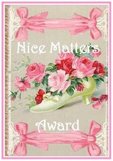With serendipitous timing, my book circle read ‘The Ghost’ by Robert Harris, this month. Serendipitous, because the main character of the book is someone engaged to be the ghost writer of the ex-Prime Minister of the UK, who resembles to a certain extent our own ex-Prime Minister, Tony Blair. In the novel, he is accused of crimes relating to extraordinary rendition, which, of course, has been in the news again quite recently. In addition, we have just observed the tenth anniversary of 9/11, the day which triggered off all such events in the last ten years.
The narrator - the ghost - had a humorous self-deprecating voice, which made the book very readable, even though the book, in time, developed a darker edge to it. He, as befits a ghost, does not have a name. It is suggested that the ghost writer takes on the identity of the person who he is ghosting, and in the case of the narrator, he does take on some aspects of his subject’s life. He also, in this particular case, follows the path of his dead predecessor who has been killed - either in an accident, or by design.
The ex PM who bears a different name from our own ex, and has a different background/upbringing/university and also a shaky marriage with sexual liaisons going on both on his part and his wife’s, quite unlike (one assumes) the marriage of TB and CB. Nevertheless, one cannot help finding resemblances to TB, and wondering, therefore, how the author got away with this piece of chutzpah.
The book then, is on the whole, a thriller, but the political aspect is interesting and gives food for thought. I haven’t read any of Robert Harris’s novels before, but it was definitely a page turner, and I enjoyed it.
